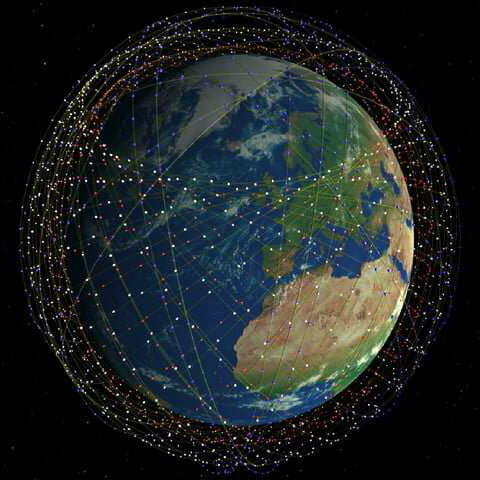Tydzień w gospodarce
Category: Trendy gospodarcze

(SpaceX, Public domain)
Mr. Akimov also told media that Moscow and Beijing will sign an agreement later this year on the deployment of ground stations to work in concert with Russian Glonass and Chinese Baidu satellite navigation systems.
Besides bringing internet connection to remote geographical locations, low-orbit satellite constellations are supposed to upgrade global communications network for the new era of internet connectivity. In the 5G, base stations alone are not sufficient to cover the whole world with the fast-speed internet connection.
Similar projects are currently being developed by some of the world’s largest tech companies, such as Amazon, Facebook or SpaceX.
Another major player is the London-headquartered OneWeb. Founded by a tech entrepreneur and a former Google manager Greg Wyler in 2012, the company launched a network of more than 650 low-orbit satellites in February this year. In 2015, OneWeb signed an agreement with the Russian space agency Roscosmos to launch low-orbit satellites with the help of Russian rocket-launchers Soyuz.
In July 2017, OneWeb filed its application for Russian landing rights. Since then, new requirements for obtaining landing rights relating to national security of the Russian Federation have been introduced. A few months later, in August 2018, Russia’s secret service (FSB) spokesperson Vladimir Sadovnikov said that the low-orbit satellite constellation of OneWeb represents a national security threat to Russia, according to Reuters. “FSB is worried that OneWeb will obtain a monopoly in providing internet access to remote regions of the Russian Federation,” Mr. Sadovnikov said. To strike a compromise with the Russian authorities, OneWeb offered to lower its stake in a joint venture created in 2017 with one of Roscosmos Group companies. In December last year, OneWeb offered the Russian government a 12,5 per cent of shares in the OneWeb-Roscosmos joint venture in return for landing rights in the country.
Sources involved in the negotiations told Reuters that the Russian government has not made a decision on the OneWeb proposal and is still discussing the allocation of the rights and the possible share purchase.
In August 2019, the company went even further and appointed a Russian, Mikhail Kaigorodov, a commercial director for Russia. At the time of the appointment, the company stated that it is “committed to respecting the laws in all countries in which it operates and will work with the authorized state agencies to ensure compliance.”
Despite all attempts of OneWeb to convince Russian authorities to allow them to work in the country, it now seems that the Russian government has decided to abandon the project altogether, favoring a Russian-Chinese cooperation.
Russia has been developing its own low-orbit satellite constellation under the project name of “Ether.” Unofficially known as “Russian OneWeb”, Ether has been introduced in the framework of the Russian state program “digital economy” in November 2017. According to the Russian business daily RBC, the project has been allotted around RUB300bn from the state budget.
It is not clear whether a Chinese company will enter into a joint-venture with the existing Ether, or a completely new entity will be created. A potential partner company for the “Russian OneWeb” is a private Chinese satellite constellation provider GalaxySpace.
According to the company’s homepage, GalaxySpace was founded in 2016 to “mass produce low-cost, high-performance, small satellite, and build the world’s leading LEO broadband satellite constellation and global coverage with 5G communication network.” The company has received financial support from Shunwei Capital Partners, the firm backed by Xiaomi founder Lei Jun; Morningside Venture Capital; and IDG Capital, according to Global Times.
Filip Brokeš is an analyst and a journalist specializing in international relations.

